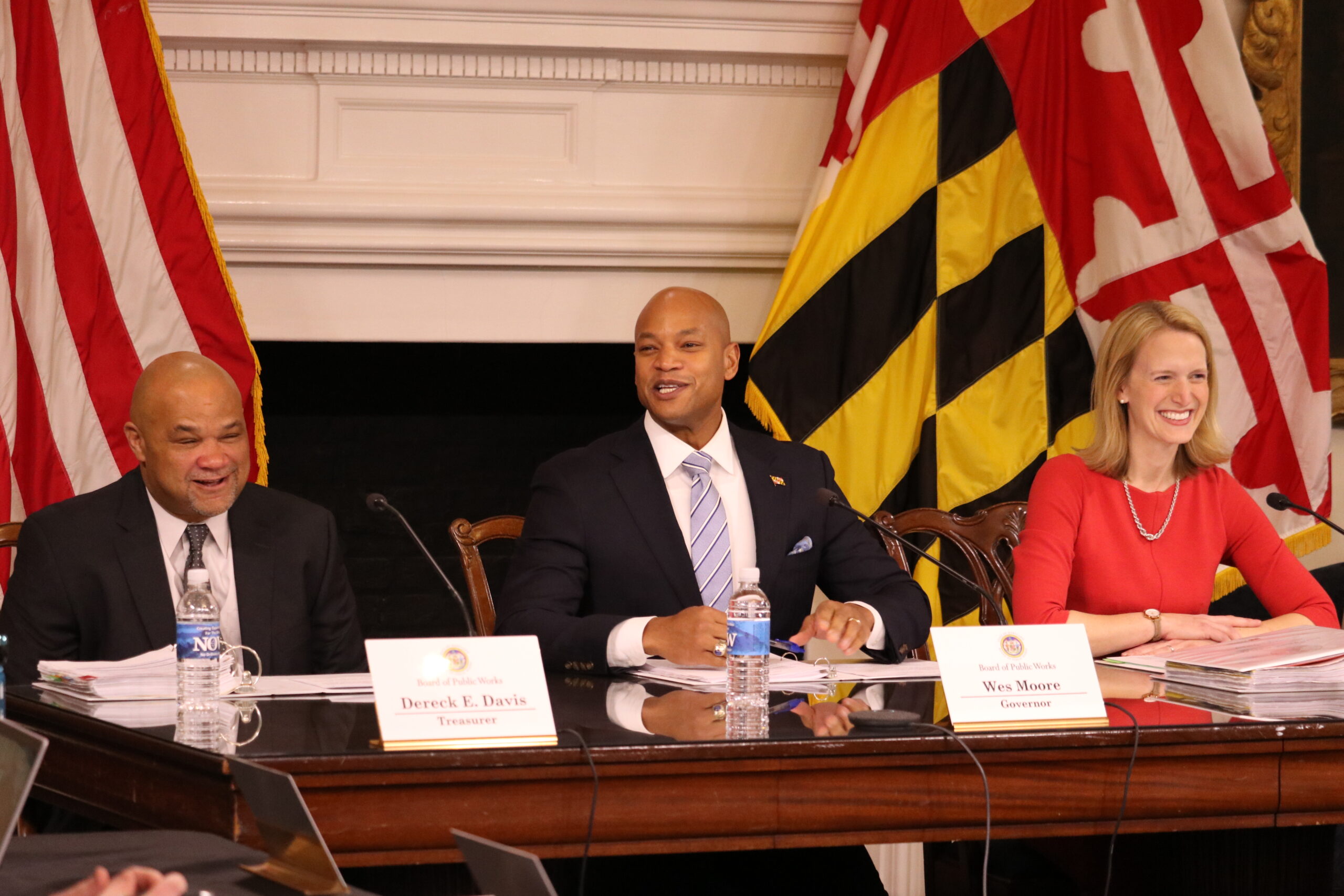New Board of Public Works vows improvement on state’s minority contracting goals

In their first meeting as members of the Board of Public Works, Gov. Wes Moore (D) and Comptroller Brooke Lierman (D) said the panel will sharpen its focus on including more diverse businesses in state contracts.
“We will ensure that we are treating minority business enterprise goals not just as suggestions from prime contractors, but as promises and commitments made to both the state and our MBE communities who simply want a fair shot at competing for and receiving work,” Moore said.
Moore noted that too many agency contracts that come before the board — which reviews millions of dollars in state contracts each year and oversees state property — include waivers for participation by minority- and women-owned businesses.
“The era of agencies generously issuing MBE waivers and not holding prime contractors accountable for meeting MBE goals … those days and that era has come to an end,” Moore said.
Lierman agreed with Moore’s focus on MBE participation, noting that the state was a national leader when it started an MBE program 45 years ago. “But we have fallen far behind,” she said. “Since 2016, MBE participation on state contracts has been 20% or below and in 2020 it was just 14%.”
Lierman said there’s also a “bait and switch” problem with the state’s current MBE system, in which prime contractors operate on an “honor system,” promising to include minority contractors, at the outset of an agreement but may not always deliver. That should shift, Lierman said, to an “accountability system.”
“We’re not today able to tell the public how many businesses who were awarded contracts last year actually met their [minority business enterprise] goals, how many were on budget and on time and how many made contract modifications,” Lierman said.
Among reforms Lierman said she’d like to see at the board are more public participation in board meetings, annual audits of contract performance, and increased scrutiny of labor practices at bidding companies.
Moore said his administration would make it easier for disadvantaged businesses to get certified to participate in state procurements.
He added that the decisions of the board will be “led by data, and not by election cycles” and “performance, not patronage.”
Treasurer Dereck Davis (D), the third member of the panel, who has served on the board since his election by the General Assembly in December 2021, noted the historical nature of Wednesday’s meeting — with Moore as the state’s first Black governor and Lierman as the first woman comptroller — but said that the leaders, as a group, understood that getting elected “wasn’t the assignment.”
“It doesn’t matter if all these elections occurred and nothing came as the result of that,” Davis said. “I’m excited because I know the talent that they bring, the work ethic that they bring, the hustle that they bring, and the citizens of Maryland are going to benefit from that.”
The spending panel, which is unique among the states, was established in 1864.
“For over 159 years this body has served a critical function to the state of Maryland, where the livelihoods and lives of generations of Marylanders have been shaped by the decisions of previous boards,” Moore said.
No reprieve for charter bus company
During Wednesday’s meeting, the panel heard details about a dispute between the Maryland Transit Administration and the former operator of commuter bus service between Frederick and Montgomery counties.
Ron Dillon Jr., the owner of Atlantic Coast Charters, was at the meeting to protest a $1.7 million emergency contract for a new company to provide the service on Route 515.
In December, Dillon and his company walked away from a five-year state contract to operate the bus service through October 2024 after Dillon said rising fuel prices and other economic pressures made the service unprofitable.
Dillon told members of the panel that he tried to negotiate changes to the state contract for several months, to no avail, before giving just a few weeks’ notice that the contract would be terminated. He said he also offered a bid for the six-month emergency contract — even though his company was ineligible to bid — that was $835,000 lower than the contract the board was considering Wednesday.
Maryland Transit Administrator Holly Arnold told the board that the agency tried to be a good partner with Atlantic Coast Charters and she noted that charter providers received increased funding through COVID stimulus programs. But the contract for the commuter service Atlantic Coast Charters entered had fixed terms that needed to be met, she said.
Despite the agency’s stance on Dillon’s contract, Arnold also said that the agency changed policy in 2021 to include a new line-item for fuel and to include other flexibility for commuter bus service contractors. The new terms will be part of the permanent contract for the Route 515 service, which is expected to start in July.
While each board member asked questions of Arnold and Dillon about the contract dispute, the panel ultimately voted unanimously to move forward with the new contract without comment.
Visions of a reinvigorated Blue Line Corridor
Prince George’s County Executive Angela Alsobrooks (D) was at Wednesday’s meeting to celebrate the inking of a memorandum of understanding between the county and the Maryland Stadium Authority, which will oversee construction of $400 million in community amenities along Metrorail’s Blue Line Corridor.
Moore called the agreement an “economic game changer” for Prince George’s County, which will use the funding to develop a live music amphitheater, a civic plaza, cultural center, sports fields and other facilities around FedEx Field, which is currently home to the Washington Commanders. The economic development project will move forward even if the NFL team moves from the county, state and local leaders have promised.
“The Blue Line Corridor will be the region’s next big destination and Prince Georgians will have a wonderful new set of amenities to enjoy in their own backyard,” Alsobrooks said.




 Creative Commons Attribution
Creative Commons Attribution